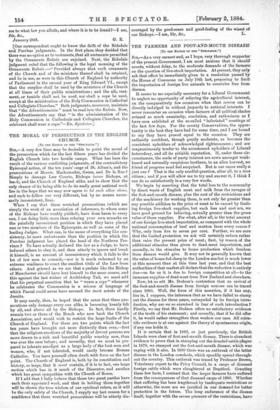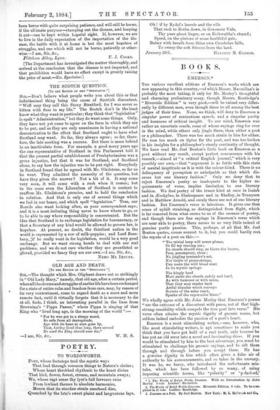THE FARMERS AND FOOT-AND-MOUTH DISEASE [To THE EDITOR OF THZ
svacznea."-] Sim—As a very earnest and, as I hope, very thorough supporter- of the present Government, I am most anxious that it should, accede, without delay, to the moderate demands of the farmers on the question of live-stock importation. At present, they only ask that effect be immediately given to a resolution passed by- the House of Commons on July 10th last, proposing to limit the importation of foreign live animals to countries free from disease.
It seems to me especially necessary for a Liberal Government to neglect no opportunity of relieving the agricultural interest,. on the comparatively few occasions when that course can be- directly indulged in without jeopardy to national interests. I never remember an occasion when farmers of all political shadee evinced so much unanimity, resolution, and enthusiasm as I have seen exhibited at the so-called "infuriated" meetings of the last few days. For the county Conservatives, the oppor- tunity is the best they have had for some time, and I am bound to say they have proved equal to the occasion. They are- radiantly confident, though gently moderate, as becomes the- consistent upholders of acknowledged righteousness ; and are- magnanimously tender to the accustomed upholders of Liberal' heterodoxy, and all its pitiable reputation. If, under these cir- cumstances, the seeds of party interest are sown amongst weak- 'kneed and naturally suspicious brethren, to an alien harvest, no friend of progress need feel surprised. But is our cause really ar. just one ? That is the only needful question, after all, to a true citizen ; and if you will allow me to try and answer it, I think I can do so satisfactorily in a very few words.
We begin by asserting that the total loss to the community by direct waste of English meat and milk from the ravages of the foot-and-mouth disease, plus the cost of the restrictions and of the machinery for working them, is not only far greater than any possible addition to the price of meat to be caused by limit- ing foreign live-stock supplies, but such loss and cost are, we have good ground for believing, actually greater than the gross: value of those supplies. For what, after all, is the total amount of our foreign live-stock importation, as compared with the whole national consumption of beef and mutton from every source Why, only from five to seven per cent. Further, we are sure- that the limited protection we ask will certainly reduce rather than raise the present price of meat; first, by reason of the additional stimulus thus given to dead-meat importation, and secondly, to the stimulus to home production which freedom from disease would give. It may not be generally known that the value of home-fed sheep in the London market is much lower at this moment than at this time last year, and that the best authorities of that market all declare that the reduction is entirely- due—so far as it is due to foreign competition at all—to the. immense supplies of dead meat from New Zealand and elsewhere.
Now, let us sift Mr. Dodson's contention that no arrival of the foot-and-mouth disease from foreign sources can be traced since 1880. Well, the force of this assertion, if it has any, lies in, I suppose, the inference that as we have failed to stamp- out the disease for three years, unimpeded by its foreign intro- duction, why arc we so exercised in fear of such introduction ?' Firstly, we say that Mr. Dodson offers no satisfactory evidence of the truth of his statement ; and secondly, that if he did offer it, he would rather strengthen than weaken our case. All scien- tific evidence is at one against the theory of spontaneous origin,. if any one holds it.
It is certain that in 1880, or just previously, the British Islands were clear of foot-and-month disease. There is abundant evidence to prove that in stamping out the dreaded cattle plague in 1879, we stamped out the foot-and-month disease, which was raging with it also. In 1880 there was an outbreak of the latter disease in the London cowsheds, which speedily spread through- out the country. This outbreak was traced by Professor Brown, Veterinary expert to the Privy Council, to a cargo of diseased foreign cattle which were slaughtered at Deptford. Granting these few facts, I contend that the larger farmers have suffered from the consequences of that diseased cargo of 1880. Whether that suffering has been lengthened by inadequate restrictions or otherwise, the more are we justified in our demand for better protection in the future. The long endurance of the disease itself, together with the severe pressure of the restrictions, have been borne with quite surprising patience, and will still be borne, if the ultimate purpose—stamping out the disease, and keeping it out—can be kept within hopeful sight. if, however, we are to live in the daily expectation of the importation of the dis- ease, the battle with it at home is but the most hopeless of struggles, and one which will not be borne, patiently or other- wise.—I am, Sir, &c.,
[The Department has investigated the matter thoroughly, and arrived at the conclusion that the disease is not imported, and that prohibition would have no effect ex.cept in greatly raising the price of meat.—En. Spectator.]



































 Previous page
Previous page